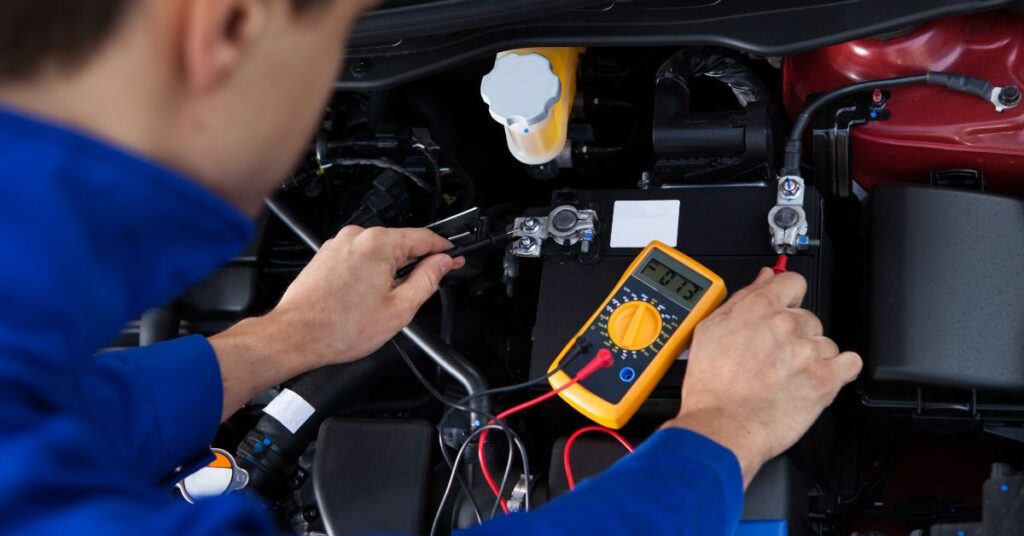
Table of Contents
The car battery acts as the lifeblood of your vehicle, powering everything from your headlights to the stereo. The average battery lifespan ranges between 3 to 5 years, but this duration can be significantly prolonged with the right care and attention. However, external factors like environmental conditions, driving habits, and accessory usage can shorten or extend this duration. Understanding and navigating these variables is essential to extract maximum life from your battery.
How Does A Car Battery Work?
Chemical reactions occur inside every car battery to unleash the power needed to start and run your vehicle. This intricate process revolves around the interplay between acid and lead plates. However, like all things, these components have a finite life. But with proper maintenance and understanding, you can ensure they last as long as possible, offering you uninterrupted service. Without further ado, we can talk about how you can extend the lifespan of your car’s battery.
Tips To Extend Your Car Battery’s Life
1 – Regularly Check and Maintain the Battery’s Cleanliness
Over time, battery terminals can accumulate grime, dust, and corrosion. This build-up can disrupt the efficient power transfer, leading to sluggish performance. Cleaning these terminals isn’t a super difficult task. A simple mixture of baking soda and water can scrub the accumulated debris. Once clean, a light coating of petroleum jelly can deter future corrosion, ensuring optimal connection.
2 – Ensure Proper Charging
Every battery has an optimal charging level. Straying too far below or above this can decrease battery life and efficiency. A persistently undercharged or overcharged battery can spell trouble. Symptoms like dimming headlights or slow engine cranks can hint at charging issues. Regular professional checks can ensure your battery stays within its optimal charge range, maximizing lifespan.
3 – Limit Short Rides
Short, frequent trips can be detrimental to your car battery. They often don’t allow the battery enough time to charge fully, gradually reducing overall charge capacity.
To counteract this, try incorporating longer drives into your routine. These extended runs give the battery adequate time to recharge fully. Consider investing in a quality battery charger if long drives aren’t feasible.
4 – Turn Off All Lights When Exiting the Car
We’ve all done it—left an interior light on overnight. However, these small oversights can drain the battery substantially. Always double-check to ensure all inside and outside lights are turned off before leaving your vehicle. A quick routine check can be the difference between a morning of smooth sailing and being stranded.
5 – Regulate the Temperature
Your car battery isn’t a fan of extreme temperatures. The sweltering heat can speed up the chemical reactions, leading to quicker degradation. Conversely, frigid conditions can slow these reactions down, hindering performance.
Park your car in a garage or shaded area during the summer months. In winter, consider using a battery warmer. These steps can safeguard your battery from temperature-induced wear and tear.
6 – Unplug Devices When Not In Use
Today’s vehicles are often filled with plugged-in devices, from smartphones to GPS units. These gadgets, especially when left connected overnight, can draw power and strain the battery.
Make it a practice to unplug devices when they’re not active. This simple habit can spare your battery unnecessary drain, ensuring it’s ready to go when you are.
McCullough NAPA Auto Care Can Test The Strength Of Your Car’s Battery
While individual care and maintenance can prolong the life of your car battery, there’s no substitute for professional expertise. McCullough NAPA Auto Care has a seasoned team, the equipment, and the know-how to accurately test the strength and health of your car’s battery. Don’t leave it to guesswork. Ensure your vehicle’s power source is in top shape by seeking expert assistance in Sandy Springs, Georgia.
Contact us today to schedule your battery diagnostic service.
FAQ About Extending The Life Of Your Car Battery
To prolong your car battery’s life, regularly clean its terminals, ensure proper charging, limit short rides, turn off lights when not in use, regulate temperature, and unplug devices when they’re not needed.
In some cases, a deeply discharged battery can be revived using a slow, trickle charge. However, if a battery is old, damaged, or has suffered from sulfate buildup, it may not be salvageable and would require replacement.
If you won’t be using your car for an extended period, consider disconnecting the negative battery terminal, using a battery maintainer or trickle charger, or occasionally starting the car and letting it run for a few minutes.
To strengthen a weak battery, ensure it’s regularly charged to its full capacity, clean any corrosion from the terminals, and consider using a desulfating charger. However, replacement may be the best option if the battery is past its prime.
Factors such as excessive heat, leaving lights on, short frequent drives, allowing the battery to remain deeply discharged, and not maintaining cleanliness around battery terminals can all shorten its lifespan.
External factors like extreme temperatures, leaving accessories on when the car is off, frequent short drives, and lack of maintenance can all contribute to reduced battery life.
While idling does charge the battery, it’s not the most efficient way. Driving the car is a more effective way to charge the battery as the alternator can produce more power at higher engine RPMs.

